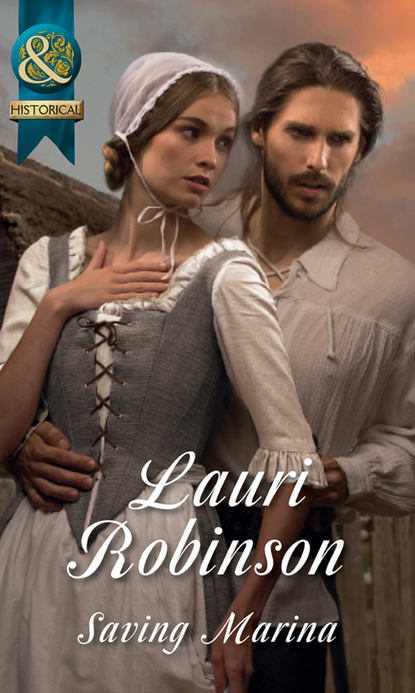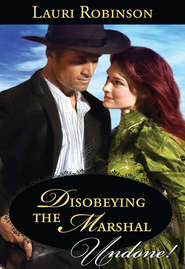По всем вопросам обращайтесь на: info@litportal.ru
(©) 2003-2025.
✖
Saving Marina
Настройки чтения
Размер шрифта
Высота строк
Поля
Richard didn’t know much about ill children but knew shipmates got well faster once they were up and about, and despite refusing to leave, every instinct he had was still telling him to get his daughter and depart this place as soon as possible. “Perhaps Gracie would like to go downstairs to eat.”
Gracie’s eyes lit up. For a moment, he saw himself in her and knew that must be how his eyes glowed when they settled upon the great span of water surrounding his ship. Smiling brightly, she pushed aside the covers and scooted toward the edge of the bed.
“The stairs may be a bit much for her yet,” Marina said gently.
“Not if I carry her,” Richard supplied. Without waiting for Marina’s answer, he asked his daughter, “Would that be all right with you, Grace? If I carried you?”
She nodded enthusiastically.
Marina, on the other hand, seemed torn. “I don’t want her to lose the ground she’s gained.”
“She won’t,” Richard assured her. “I’ll carry her back upstairs, too.” Without further ado, he plucked the child off the bed. She wasn’t any heavier than one of his ledger books and felt far more fragile. Far too fragile. Once again something inside him fluttered. The life of a sailor had always fulfilled him, never left him wondering or wanting more, yet holding his tiny daughter in his arms made him question if he’d made the right choice years ago. If he’d remained in Salem Village rather than returning to the sea, Gracie wouldn’t be in this condition and Sarah might still be alive. They could even have had more children.
“We all have regrets.”
He lifted his head and caught Marina’s thoughtful expression.
“It doesn’t pay to dwell on them,” she added with a smile as gentle as the one she’d given his daughter. “Forgiveness, including ourselves, is the pathway to salvation.”
She was right. No one could change the past; nor should they allow it to possess them. He owed Marina his gratitude, too. If not for her, Grace may have died. He would never have known his daughter then. That thought hit solemnly in his mind and gut.
Not ready to react to that or to let her know she’d read his mind, he gathered the length of material dangling beyond Grace’s feet. “What is all this?”
“Gracie is wearing one of my nightdresses.” Marina had walked around the bed and brushed his hand aside in order to twist up the extra material and tuck it between Grace’s thin frame and his chest. “I needed to wash hers this morning.”
Richard heard what she said but chose to interpret the statement to mean Grace didn’t have ample nightclothes. That should not be. He’d sent material to his dead wife regularly. Yards upon yards of sturdy cotton, knowing the finer silks and other materials he’d once shipped would not be welcome. The last shipment should have arrived this spring, after Sarah’s death. Of course, he hadn’t known she’d died then.
He pondered on that as he carried Grace down the narrow hall. His wife had died. Should he be in mourning? It wasn’t as if he’d held any ill will toward Sarah. It wasn’t as if he’d held any great love for her, either. The affection that had sparked between them had never been given the chance to grow. Not as it should have. Which was just as well. Sailors had no right taking a wife. They were already married to the sea. He’d known that even back then but had let his physical needs overshadow his good sense. Earl had pointed that out to him, and he’d come to accept it over the years.
Richard shifted Grace in his arms, not because of her slight weight—he could have been carrying a sparrow for all she weighed—but because he didn’t want her to bump the wall of the narrow stairway. She lifted her head and gazed upon his face deeply and perhaps a bit critically.
“Are you really my papa?”
“Yes, I am.”
“Marina told me if I prayed hard enough, you’d come.”
Richard glanced briefly toward the woman moving down the stairs ahead of them. He still had more questions than answers. “She was right.”
“Where’s your boat?” Grace asked.
He grinned. “In the Boston Harbor.”
A tiny frown formed before she nodded.
“Would you like to see it?” he asked.
The smile returned tenfold. “Yes.”
“Well, then,” he said, “as soon as you’re better, I’ll take you to see the Concord.”
“You will?”
“Yes, I will. It’s a mighty ship,” he said. “But you have to eat and get strong. It’s a long way to Boston.”
Her little head bobbed up and down. “I will.”
It had been years since he’d seen Sarah, and he wondered if Grace looked like her. He should remember, but an image of his wife no longer formed in his mind. There was no explanation as to why, other than that she’d become nothing more than another payment, akin to taxes or merchant fees. That was no way for a man to think of his family or something he was proud of, even if it wasn’t out of the ordinary. Plenty of captains had wives and families, sometimes numerous ones, just as William had said, in ports all around the world. One of the things he’d carried pride in was the fact he wasn’t like all other sea captains. Not in that sense or in others. He treated his shipmates fairly, along with the merchants and countries whose cargo he hauled. His reputation was well established, and now it would also become known that he took care of his family. He didn’t need to vow it; he knew it.
“What do we have here?” William had awakened from his nap and was precariously rising to his feet as they entered the front room. “Is that Gracie?”
The girl nodded while Marina answered, “Yes. She wants to eat at the table. Would you care to join her?”
“I’ve been smelling that chicken you’ve been boiling all morning,” William said, using both hands to get his stump leg solid on the floor. “It’ll be good to eat some.”
Marina waited for her uncle to cross the room. Richard did, too, while noting how the young woman stood ready to aid William if the need arose. It didn’t. Once the old man got the wooden leg in rhythm with his other one, he scurried past them with the speed of a sailor with two good legs.
“You will be joining us, Richard,” William stated.
It had been hours since he’d partaken in a brief repast before leaving Boston, and all sailors were known for one thing—that of never bypassing the offer of a meal. “Thank you,” he answered and waited for Marina to enter the hall.
In the kitchen that, indeed, did host a very appetizing scent, Richard paused before setting Grace on one of the chairs. Her chin would barely come up to the tabletop if he set her down. Noting a pine box on the shelf near the brick oven built into the side of the fireplace, he crossed the room. “May I use that?” he asked, pointing at the box.
“The salt box?” Marina asked. “Whatever for?”
“Yes, the salt box,” he assured her. “For Grace to sit upon so she can see over the table.”
“That’s a splendid idea.”
The expression on her face was a mixture of surprise and delight, a sight that intrigued Richard. He pulled his eyes away and gathered the box. After he set it on the chair, he lowered Grace upon it and took a seat himself. The table was soon set with plates and silverware and a host of foodstuffs in plated dishware. It made sense that William would have such luxuries while many colonials still used wooden spoons and trenchers. Ships hauled crates of dishware and utensils to America regularly, had for years.
“Marina insists on feeding us more than two times a day,” William said. “She claims her family ate morning, noon and evening, even on Sundays. I’ve told her on a ship, a man eats when a meal’s prepared, whether it’s the middle of the day or the middle of the night.” He chuckled before adding, “I’ve grown accustomed to her ways, those of my family from the old country that I’d forgotten about until she arrived, although that too we keep private.”
Having traveled the world, Richard had eaten meals at all times of the days, but he knew a custom of the Puritans was two meals a day, morning and midafternoon, after church services. He also knew their penchant for allowing no work of any kind on Sundays, including preparing meals. If there were no leftovers, they ate bread and water or fasted. He’d witnessed it on the ship that had carried Sarah and her family to America. From what he’d seen so far, Marina did not fit into the Puritan world in any way. So why was his daughter here rather than with one of the families in the village?
“We’re not trying to pull the wool over anyone’s eyes,” William continued. “We just don’t need any more fingers pointed at us.”
Although he could assume, Richard asked, “Why would fingers be pointed at you?” Following William’s gesture, he began to ladle food onto his plate. The bowl Marina had set before Grace contained clear broth, while the soup he spooned onto his plate had been thickened and contained chunks of chicken, carrots and potatoes, as well as dumplings. There was also bread and a thick pudding that smelled of maple syrup, and cider for their earthen mugs.
“I told you.” Sighing heavily, William looked at Marina, who’d just sat down, before he said, “They believe Marina’s a witch.”
Tension returned to Richard’s neck—his entire spine, actually. This witch business was more than frustrating. It had become an assault against his good sense. Over the years, he’d spent time with many types of people and cultures. In some countries people worshipped witches; in others, they feared them. Went so far as to hire witch hunters to eradicate them from the countryside far and wide. He’d never believed one way or the other, but had met a few witch hunters and would be hard-pressed to come up with a more evil profession comprised of more wicked men.
His gaze crossed the table to land on Marina. Her chin was up and her gaze solid as it met his, eye for eye. He might admire her grit, but others wouldn’t. A witch hunter he’d met in Scotland a few years ago, John Kintor, claimed that was how he recognized a witch, by the way she stared into a man’s soul. Kintor’s father had been a witch hunter, too. Several years ago father and son had captured more than two hundred witches in less than a year—or so they claimed.
A cold knot formed in Richard’s stomach at the thought of Marina encountering the likes of Kintor. “Why would they believe that?”
Her gaze drifted toward Gracie for a fraction of a second before she stated, “Because I agreed to stand trial for being one.”











